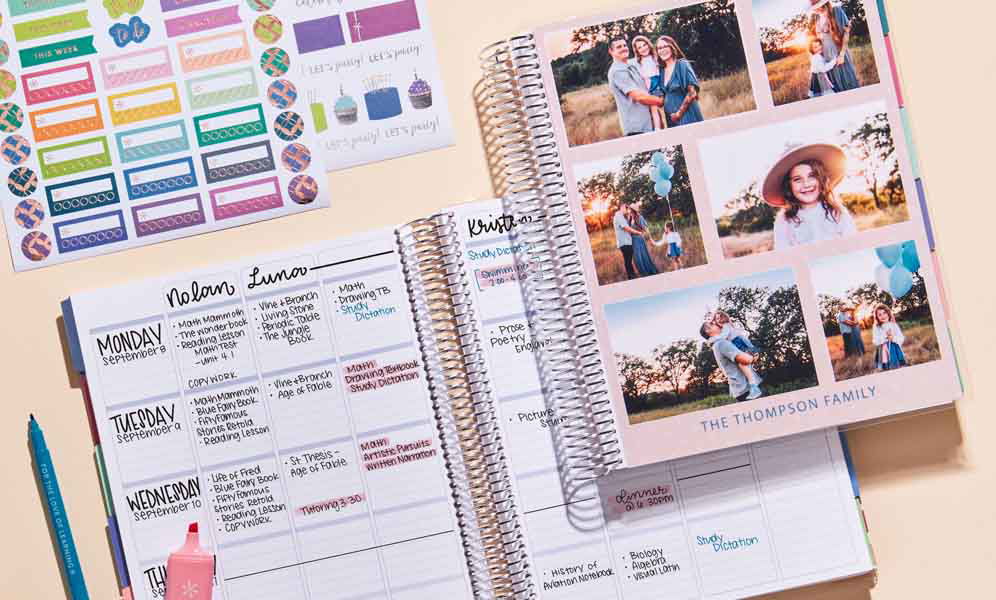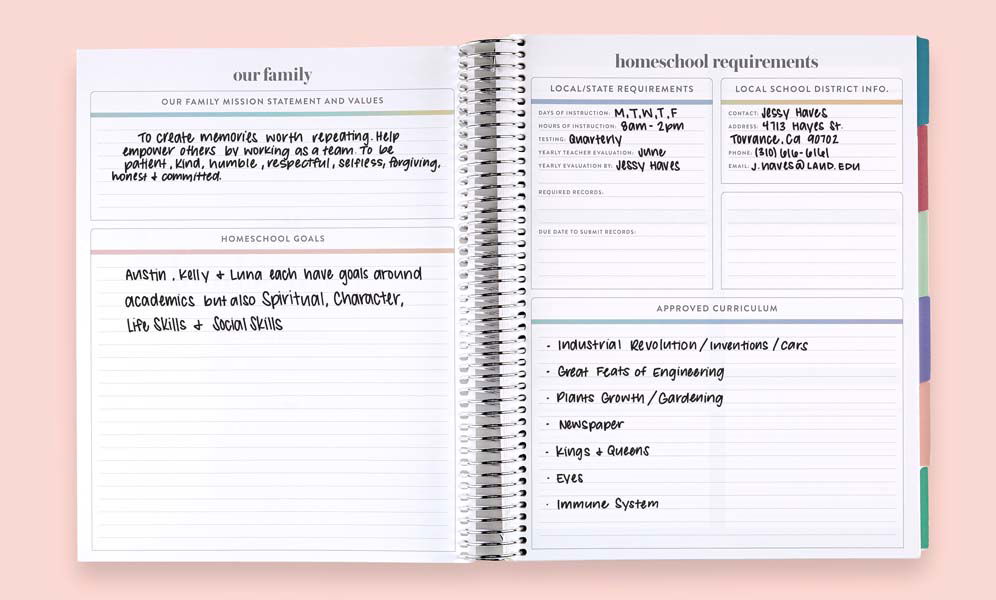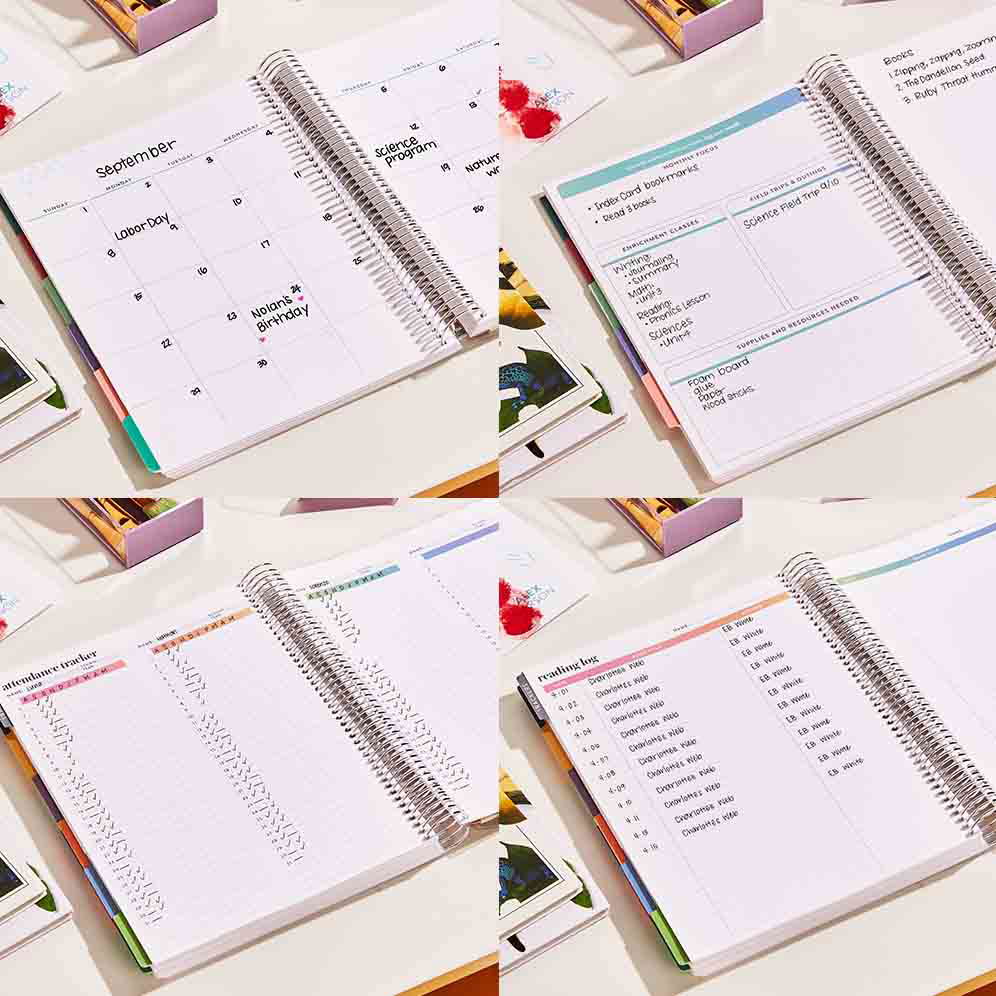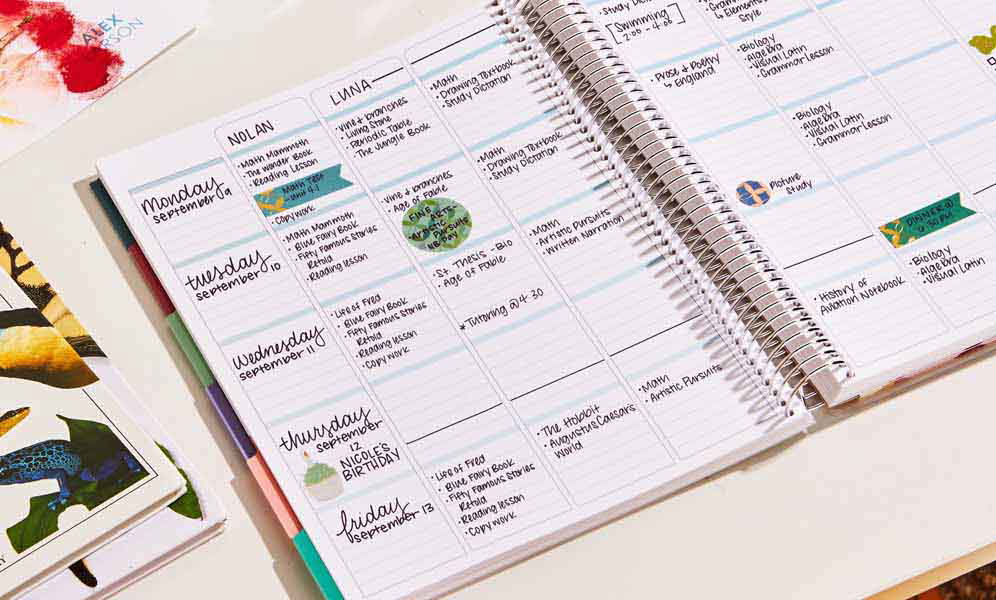Homeschool Planning Made Easy: How to Plan Your Year

Welcome, homeschool parents and planning enthusiasts! Embarking on the journey of homeschooling can be both exhilarating and overwhelming. Let's set you up for success with tips and tricks from our homeschool planning experts, designed to help you navigate this path with ease and confidence.
In this planning guide, we'll walk you through how to plan your homeschool year effectively, ensuring a successful and enriching experience for you and your kids. With the right approach and tools, you can create an engaging and effective educational experience tailored to your family's unique needs.
Getting Started with Homeschool Planning

Homeschool planning begins with setting a solid foundation. Taking the time to define your objectives and gather the necessary resources can make a significant difference. This initial stage sets the tone for your entire educational journey.
Understanding the unique needs of your family will help you tailor your approach. Each child learns differently, and acknowledging these differences is crucial. Creating a plan that adapts to your children's learning styles is key to a successful experience.
Setting Goals for Your Homeschool Year
The first step in creating a homeschool plan is to set clear and achievable goals for your homeschool year. What do you envision for your kids by the end of the school year? Whether it’s mastering math skills, diving into literature, or exploring new scientific concepts, having specific goals in mind will guide your planning process. Write down your goals in your homeschool year planner to keep them top of mind throughout the year. Setting these objectives provides a roadmap for the entire year and keeps you focused on your child's progress.
Choosing the Right Homeschool Planner
Choosing the right homeschool planner is crucial for staying organized. The Erin Condren Homeschool Planner is a top choice for many homeschooling families due to its flexibility and comprehensive features. Leveraging the proven layout of the best-selling Erin Condren teacher planner and specifically designed for homeschooling, it allows you to track lessons, assignments, and extracurricular activities all in one place. A well-organized planner is the backbone of any successful homeschool plan. Finding a planner that suits your style and needs will make the planning process more enjoyable and effective.
How to Plan Your Homeschool Year

When you start to plan your homeschool year, consider the broader picture first. Think about your family’s overall schedule and any major events. Incorporate these into your academic calendar to create a balanced approach.
Breaking down the school year into manageable chunks can simplify the planning process. Focus on organizing your subjects and activities to fit into these segments. This method ensures that you cover all necessary material without feeling overwhelmed.
Mapping Out Your Academic Calendar
Begin your homeschool plan by mapping out your academic calendar for the entire school year. Decide on start and end dates, holidays, and any planned breaks. This helps create a clear structure for your homeschooling and ensures you cover all necessary material without feeling rushed. An organized calendar provides a visual timeline, helping you stay on track and meet your educational goals.
Organizing Subjects and Curriculum
Next, organize your subjects and curriculum. Determine which subjects you’ll cover daily, like math and language arts, and which can be scheduled weekly, such as science or art. Use your planner to break down the curriculum into manageable units, making the planning process more straightforward. By structuring your subjects efficiently, you can ensure a balanced education that covers all core subjects and enriches your child's learning experience.
Establishing a Daily Routine
A consistent daily routine is essential for a productive homeschool environment. Plan your day to include lessons, breaks, and extracurricular activities. This routine helps kids know what to expect and creates a balanced approach to learning. Be sure to leave room for flexibility in your homeschool lesson planning to accommodate spontaneous learning opportunities. A well-balanced routine fosters a healthy learning atmosphere, making education a joyful part of daily life.
Homeschool Lesson Planning Tips

Effective homeschool planning requires breaking down tasks into manageable steps. This ensures that you cover all necessary topics without feeling overwhelmed. A strategic approach helps maintain a steady pace throughout the school year.
Incorporating a variety of teaching methods can enhance your homeschool experience. Using different ways to present information keeps children engaged and caters to various learning styles. Experiment with different techniques to find what works best for your family.
Breaking Lessons Down Into Manageable Units
Effective homeschool lesson planning involves breaking lessons into smaller, manageable units. This keeps kids engaged and makes it easier for you to plan. Use your homeschool year planner to outline weekly and monthly goals, then break these down into daily tasks. Smaller, achievable units help maintain your child’s interest and make it easier to track their progress.
Integrating Different Ages and Learning Styles
Homeschooling multiple children of different ages and learning styles can be challenging. Try to integrate lessons whenever possible to cater to various ages and learning styles. Group activities and projects can be a fun way for kids to learn together. Tailor your teaching methods to suit each child’s unique needs, whether they’re visual, auditory, or kinesthetic learners. This inclusive approach ensures that all your children benefit from the learning process, regardless of their individual learning preferences.
Incorporating Flexibility Into Lesson Plans
Flexibility is key to successful homeschool lesson planning. Life is unpredictable, and plans can change. Build buffer days into your schedule for catch-up or enrichment activities. This ensures that you can adapt your lesson plans to unforeseen circumstances without feeling stressed. Flexibility helps maintain a positive and productive learning environment for your kids. Embracing a flexible approach allows you to make the most of spontaneous learning opportunities and keeps your homeschool dynamic and engaging.
Maximizing Efficiency with Your Homeschool Planner
An efficient planning system can make all the difference in your homeschooling journey. Using your planner effectively helps streamline your daily activities and keeps everything organized. The Erin Condren Homeschool Planner offers numerous features to enhance your efficiency.
Customization is key to maximizing the benefits of your planner. Tailor it to fit your specific needs and preferences. Personal touches like color-coding and stickers can make the planner more enjoyable to use and increase its functionality.
Organizing and Customizing Your Homeschool Planner
Personalize your homeschool planner to fit your needs. Use color-coding, tabs, and stickers to organize different subjects and activities. Customizing your planner makes it more enjoyable to use and helps keep everything in order. An organized planner is a powerful tool in your homeschool plan, ensuring you stay on track throughout the year. Tailoring your planner to your specific needs enhances its functionality and makes it a joy to use every day.
Implementing Time Management Techniques
Effective time management is crucial for balancing homeschooling and other commitments. Prioritize tasks, set timers for activities, and use to-do lists to stay on track. The Erin Condren Homeschool Planner includes helpful features like monthly and weekly spreads to assist with time management. Good time management allows you to achieve your homeschool goals while also making time for family activities and personal interests. Utilizing time management techniques ensures that you make the most of each day and keep your homeschool organized and efficient.
Balancing Homeschool with Other Commitments

Homeschooling often means juggling multiple responsibilities. Find a balance by setting boundaries and creating a realistic schedule. Communicate with your family about your homeschooling commitments and involve them in the planning process. This ensures everyone is on the same page and can help support your homeschooling efforts. Balancing homeschool with other commitments requires a collaborative approach, ensuring that you meet educational goals while maintaining a harmonious family life.
Learn more with Family Goal Setting Made Easy: Tips + Examples for Success.
Additional Tips and Ideas for a Successful Homeschool Year
Incorporating various educational activities can enrich your homeschooling experience. Field trips, hands-on projects, and collaborative learning can enhance understanding and retention. These activities also provide opportunities for practical application of learned concepts.
Staying organized is essential for a smooth homeschooling journey. Keep all materials and resources easily accessible. An organized learning space can significantly impact productivity and focus.
Related: Set up your homeschool desk(s) for success with 14 Inspiring Homeschool Desk Setup Ideas for All Ages.
Incorporating Field Trips and Hands-On Learning
Field trips and hands-on learning experiences are excellent ways to enrich your homeschool curriculum. Plan regular field trips to museums, nature centers, and historical sites. Hands-on activities and experiments can make subjects like science and history more engaging for kids. These experiences help bring learning to life and keep kids excited about their studies. Incorporating diverse learning experiences ensures that your child’s education is dynamic and well-rounded.
Using Books and Online Resources
Incorporate a variety of books and online resources into your homeschool plan. Use libraries and educational websites to supplement your curriculum. Reading books on various topics can deepen your child’s understanding and provide a broader perspective. Online resources, including educational videos and interactive activities, can also enhance your lessons and keep kids engaged. Utilizing a wide range of resources enriches the learning experience and keeps it interesting for your kids.
Involving the Entire Family in the Learning Process
Involve the entire family in your homeschool journey. Family members can share their knowledge and skills, enriching the learning experience. Plan activities that include parents, siblings, and even grandparents. This not only provides a well-rounded education but also strengthens family bonds. Involving the whole family in homeschooling creates a supportive and collaborative learning environment.
Tailoring Your Homeschool Plan to Fit Your Family’s Needs
Every family is unique, and your homeschool plan should reflect your family’s needs and values. Customize your curriculum and daily routine to fit your lifestyle. This might mean incorporating religious studies, focusing on the arts, or dedicating time to community service. A personalized approach ensures that your homeschool year is meaningful and fulfilling for your family. Tailoring your homeschool plan to your family's needs ensures a relevant and enriching educational experience.
Staying Motivated and Avoiding Burnout
Homeschooling can be demanding, and it’s essential to stay motivated and avoid burnout. Take breaks when needed, and don’t be afraid to adjust your plans. Celebrate milestones and successes along the way. Remember, homeschooling is a marathon, not a sprint. Keep your long-term goals in mind and give yourself grace during challenging times. Staying motivated ensures that you and your children continue to enjoy the homeschool journey.
Related: Get organization inspiration for your homeschool classroom with 10 Homeschool Organization Ideas for Stress-Free Learning.
With thoughtful planning and the right tools, you can create a successful and enjoyable homeschool year. So, customize your new homeschool planner, pick out fun and functional school supplies, and organize your best school year yet!
More Planning Guides for Homeschooling and Beyond
Stay motivated and inspired year round with these planning guides and organizing tips preferred by homeschool moms:
- 10 Homeschool Organization Ideas for Stress-Free Learning
- Homeschooling Essentials: Your Top 10 Homeschool Must-Haves
- Best Planners for Working Moms
- 20 Tips on How to Organize Everything In Your Life
- How to Start Planning
- Teacher Lesson Planner 101
- Best School Supplies for All Ages
- Daily, Weekly, Monthly Planning Tips
- How to Set Homeschool Goals: Effective Tips and Strategies